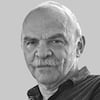Cortázar's nightmare
The interview went on for hours. He talked, remembered, laughed; and I was hanging breathlessly on his every word
It was, I think, about the worst interview I ever did. I was unable to think of a single question. However improvised an air you contrive to give the crafted final product, an interview has to be thought out beforehand. But that summer morning in December 1983 in the Norte bookshop in Buenos Aires I was told by surprise that I might interview him, if I did it there and then. Julio Cortázar told me he had arrived a day before, was going to stay a week, and that it was a very private visit. He had come to say goodbye to his mother, who was 99 years old.
"Oh, I'm sorry."
"Yes, it's just life."
For this reason, nobody knew he was in Buenos Aires. He had been 10 years abroad. In his Parisian exile he had become a great denouncer of the crimes of the Argentinian military regime. That morning I wanted to speak of literature, and he of politics, so of course we spoke of politics. In those days, politics was in the air. The last week of our country's worst dictatorship was passing in the atmosphere of hope given by those endings that involve a beginning. There was euphoria in the streets; relief in the conversations; a good deal of fear, which we sought to dissemble; and the beginning, still tentative, of the avalanche of stories of horror. Cortázar was enthusiastic, but not overly so.
Two months later, just 30 years ago, came the news of his death
"To compare the military juntas of Argentina with democracy is to move from hell to heaven, but, since I always suspected that heaven has its defects, I also think that democracy, as we feel it here, can never amount to just itself. It has to be a door that opens onto a wider evolution; an evolution that may eventually lead to a revolution."
It went on for hours. Cortázar talked, remembered, laughed; and I hung breathlessly on his every word. We ended eating in a nearby house, all very cheerful. When we left sharing a taxi I asked him something that had always intrigued me. Why ever had it occurred to him to write that Johnny Carter, the saxophonist in The Pursuer, one of his most famous stories, drifts into incurable addiction, suffers terrible withdrawals, and in the end dies of an impossible overdose of marijuana? Cortázar laughed and told me that it was a naive mistake; that in 1958, when he wrote the story, he had not the faintest knowledge of any drug, and put marijuana as he might have put chlorine bleach, and that the howler was brought to his attention by his American translator, who had hyper-translated heroin instead of marijuana, but that he didn't want to change it. And we spoke of the great howlers in literature, the watch in Hamlet and the lions in Kipling as the taxi rolled on through unknown streets.
The Pursuer was a free version of the death of Charlie Parker, who died of a heroin overdose. It is strange to imagine now a time when a Latin American in Paris, thirsty for modernity and for various underworlds, had not the faintest idea what marijuana was.
It was so long ago. Two months later, just 30 years ago, came the news of his death. Then we learned that it was he who had come to say goodbye. This year, Cortázar would have turned 100: time to ask what remains of it all. Tributes are coming thick and fast. That afternoon I asked him if he would like to have his name put to some street or plaza; if this would be his way of remaining in Argentina.
"Oh, what a dreadful idea. I hope they don't. Horror of horrors."
So he said then. Perhaps someone today will read these words in a bar on the Plaza Cortázar on the corner of Borges and Honduras in Buenos Aires.
Tu suscripción se está usando en otro dispositivo
¿Quieres añadir otro usuario a tu suscripción?
Si continúas leyendo en este dispositivo, no se podrá leer en el otro.
FlechaTu suscripción se está usando en otro dispositivo y solo puedes acceder a EL PAÍS desde un dispositivo a la vez.
Si quieres compartir tu cuenta, cambia tu suscripción a la modalidad Premium, así podrás añadir otro usuario. Cada uno accederá con su propia cuenta de email, lo que os permitirá personalizar vuestra experiencia en EL PAÍS.
¿Tienes una suscripción de empresa? Accede aquí para contratar más cuentas.
En el caso de no saber quién está usando tu cuenta, te recomendamos cambiar tu contraseña aquí.
Si decides continuar compartiendo tu cuenta, este mensaje se mostrará en tu dispositivo y en el de la otra persona que está usando tu cuenta de forma indefinida, afectando a tu experiencia de lectura. Puedes consultar aquí los términos y condiciones de la suscripción digital.









































